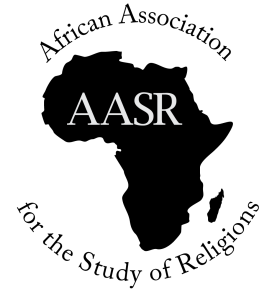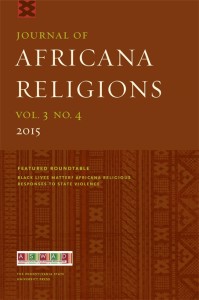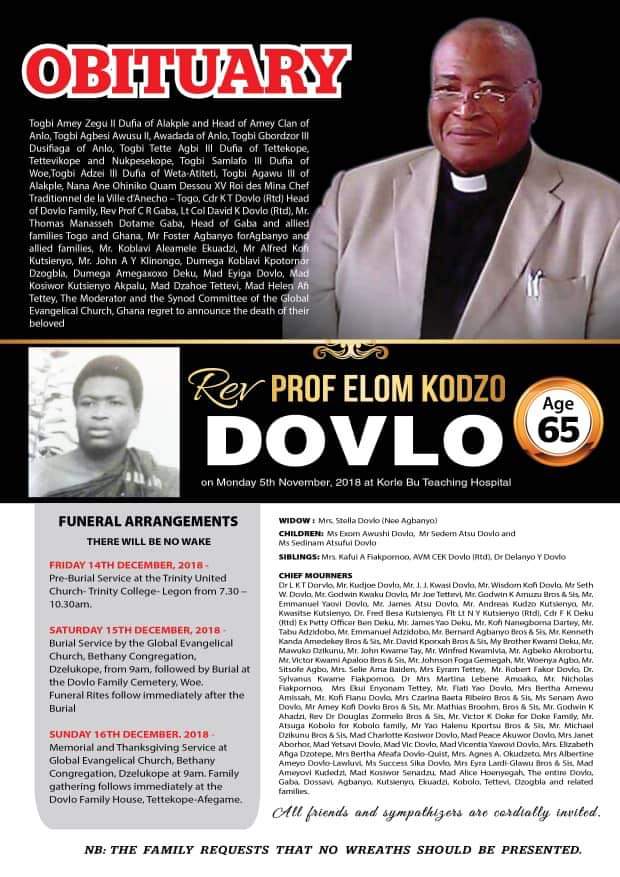2018
Holiday Greetings from AASR President Elias Kifon Bongmba
Dear Colleagues,
I send you holiday greetings on behalf of the Executive of the African Association for the Study of Religions. Thank you for your AASR membership and participation that has made us grow over the years.
2018 has been a fantastic year for us. First, the Biennial Conference held in Lusaka was a great success. I extend our thanks to the University of Zambia and the Justo Mwale University for hosting us. The Co-Chairs of the Local Organizing Committee, Dr. Marja Hinfellar, and Dr. Judith Ziwa and all the members of the committee did a fantastic job in putting together the conference on short notice, and we thank them for this service. We thank the International Association for the History of Religions, IAHR, for the generous support of our Lusaka conference. We also express our appreciation to many of you who presented papers at this conference and invite you to consider presenting papers at the next Biennial Conference that will hold in Senegal in 2020. Our Vice President, Dr. Damaris Parsitau, is in conversation with the Executive Director of the Council for the Development of Social Science Research in Africa (Codesria), and we will give you further updates in the New Year. We encourage you to prepare for that conference as well as the 22nd Quinquennial World Congress of IAHR that will convene at the University of Otago in 2020.
Second, we thank all of you who presented papers at the American Academy of Religion (AAR) and Society for Biblical Literature (SBL) during the annual meeting in Denver, Colorado. In preparation for 2019, we encourage you to send paper and panel proposals when the call for papers goes out. Consider also sending paper and panel proposals for the African Studies Association (ASA).
Third, we want to extend our congratulations to Professor Jacob Kehinde Olupona of Harvard University for receiving the Martin E. Marty Award for the Public Understanding of Religion from the American Academy of Religion. Many of you attended the award ceremony and later joined us for dinner at an Ethiopian Restaurant in Denver to celebrate the accomplishment and leadership of Professor Olupona.
Fourth, we congratulate Professor Gerrie ter Haar for the recognition that she received this year with a Life Time Membership in the International Association for the History of Religions (IAHR).
Fifth, we have signed a memorandum of understanding to collaborate with the Journal of Africana Religions, a peer-reviewed journal edited by Professors Edward E. Curtis and Sylvester A. Johnson and published by The Pennsylvania State University Press. We thank Professors Curtis and Johnson for leading this initiative and encourage you to consider submitting your work to this journal as well as book series that the journal has with the press for consideration. This amazing initiative adds to the journal list we support, including the AASR Ejournal, and the Journal of Religion in Africa.
Sixth, we are exploring opportunities for our web services that includes finding a new host and home. The move to a new hosting service is the first for us and involves a large budget for these services. I encourage all of you to pay your annual membership dues and consider making a generous gift to AASR to facilitate this transition. We have functioned and maintained a presence on the World Wide Web, at no cost at least during my tenure, and we have Professor Jan Platvoet and Professor Melissa Browning and Wes Browning to thank for their dedicated service. They will work with Dr. Sara Fretheim our Web and Social Media specialist to effect this transition. The success of this transition depends on our generosity, and I appeal to all of you to consider making a gift to make this work smoothly so that we do not lose our ability to communicate with all of you.
Thank you.
Sincerely,
Elias Kifon Bongmba
President
2018
1-Year Post-Doc at U. Virginia
The Department of Religious Studies at the University of Virginia invites applications for a one-year Post-doctoral Research Associate and Lecturer position in the religions of Africa and the African Diaspora. Candidates may specialize in either African or Diasporic religions, but must be able to offer at least one undergraduate course on each. We are especially interested in scholars whose research is centered in West Africa or the Afro-Caribbean.
The successful candidate will teach three courses during the academic year. Candidates will also be expected to conduct their own research and participate in the extracurricular academic life of the department.
Applications are open to scholars with PhDs in the study of religion or in cognate areas such as Anthropology, African Studies, History, and Literature and the Arts. ABD considered, with the expectation that the candidate will have the doctorate in hand by August 1, 2019.
To apply, visit http://jobs.virginia.edu and search on Posting Number 0624452. Complete a Candidate Profile online and electronically attach a cover letter, CV, statement of research and teaching, and contact information for three references. Review of applications will begin on December 15, 2018, but will remain open until filled. Preliminary interviews will take place via video conference and are anticipated to begin in mid-January 2019.
Questions regarding the position should be directed to: Cynthia Hoehler-Fatton at chh3a@virginia.edu
Questions regarding the application process in Jobs@UVA should be directed to: Richard Haverstrom at rkh6j@Virginia.edu
The University of Virginia is fundamentally committed to increasing the diversity of its faculty and staff. UVA is an affirmative action and equal opportunity employer. We welcome nominations of and applications from women, members of minority groups, veterans and individuals with disabilities. We also welcome others who would bring additional dimensions of diversity to the university’s research and teaching mission. We believe diversity is excellence expressing itself through every person’s perspectives and lived experiences.
2018
CfP: African Language, Literature, Music & Prayer Repertoires
Nagel Legon International Conference 2019
CALL FOR PAPERS:
African Language, Literature, Music and Prayer Repertoires:Exploring Indigenous Epistemologies and Spiritualities
Date: JULY 24th–26th, 2019
Venue: UNIVERSITY OF GHANA, LEGON
Contact/Queries: nagel.legon.conference@gmail.com
BACKGROUND
Christianity in Africa offers an abundance of linguistic resources that serve as a wellspring for African spirituality and values. However, while current scholarship that engages African Christianity often focuses on the rapid growth and diverse expressions of the faith on the continent and in the African diaspora, the role of language, music, film, and literature as significant articulations of African spirituality and values remains largely unexplored.
The language that is appropriated to convey experiences of faith and spirituality, including names, attributes and the language used to describe supernatural entities and deities may be seen to represent the embodiment of the contemporary experiences of people’s perceptions. African literature, proverbs, songs, prayers, and appellations are not only repositories of these names and attributes but also fuller expressions of African experiences and perceptions of supersensible entities and their interactions with humans, but also important expressions of indigenous spirituality and values. Similarly, in praise genres we find what has variously been called grassroots, oral, spontaneous, or implicit theology, and represents a type of “reflective theology” in its own right. Film, home videos and African literary works are yet other mediums in which aspects of African religious values and Christian spirituality are regularly featured.
By engaging religious studies, theology, social sciences, and the arts, this conference seeks to explore indigenous epistemologies and spiritualities through the prism of African language, literature, music, and prayer repertoires. We solicit contributions that explore, engage and analyze African literary works, music, prayers, oral histories, appellations, film, or praises in Africa and the African diaspora, in order to discern ways in which African spirituality and values are perceived and expressed by individuals and religious institutions and local communities. Contributions that raise issues of gender, ethnicity, identity, and colonialism/post-colonialism would be welcome. The conference seeks to demonstrate the importance of inter- and cross-disciplinary scholarship between the arts, humanities, and social sciences for more well-rounded, holistic engagement with African religions and spirituality.
This conference is hosted by the University of Ghana’s Department for the Study of Religions in partnership with the Nagel Institute’s African Theological Advance Initiative, which is generously supported with funding from the Templeton Religion Trust. For further details, check here:
Please note: for all of the sub-themes below, references to Africa or African refer equally to the African diaspora. Papers engaging issues of gender and marginalized voices are particularly welcome. Sub-themes and potential topics around which the conference is organized include but are not limited to the following:
• African spirituality and values from African theological and/or indigenous epistemological lenses
• African religions and spirituality as portrayed in African literature (colonial/post-colonial novels, dramas, poetry,
biography/autobiography, etc.)
• African values and spiritualities in historical context
• Contemporary expressions of African religions, spirituality and values in film and media
• African indigenous agents and the promotion of African values and spirituality within African Christian mission history
• Oral expressions of African religions, spirituality, and values (prayer, proverbs, parables, storytelling, idioms, etc.)
• African spirituality and values expressed within African music (gospel music; reggae; worship music; popular cultural music etc.)
• African spirituality, gender and sexuality explored within language, literature and worship contexts
***Abstracts/Panel proposals: Each prospective presenter should submit an abstract of not more than 250 words by email to nagel.legon.conference@gmail.com by January 31st, 2019. Abstracts must be prepared as Microsoft Word documents and should include the presenter’s name, title of paper, institutional affiliation, and contact information (mailing address, phone number, and email address). Panel proposals should be sent as one document with an overall abstract, and should also include the abstract and personal information for each panel member/presenter. Participants will be notified about the status of their proposals by February 20th, 2019.
***Conference Registration and Rates: (*including selected refreshments, lunches, and the conference banquet)
Early Bird Rates (March 1st–30th):
• Participants from the Global North: $100USD
• Participants from the Global South: $80
• Students/unwaged: $50USD
Late Registration Rate (April 1st–May 10th):
• Participants from the Global North: $150USD
• Participants from the Global South: $110USD
• Students/unwaged: $50USD
Accommodations: bookings will be available at African Studies Yiri Lodge (Legon Campus):
• Single room @$70USD
• Standard Room $50–$80USD
• Deluxe room @ $100USD
• Suite @ $120USD
Participants may also choose to make their own bookings at the nearby Erata hotel. Prices are subject to change depending on conference discounts:
• Single Room @$100USD
• Double Room @$120USD
**Delegates should be aware that traffic within the city to/from the University can be very heavy and time-consuming; therefore we encourage you to stay on campus!
Additional Extras:
We are planning excursions before/after the conference to Cape Coast and Elmina Castles, as well as within Accra. We are also in discussions with the hosts of “Panafest 2019” to see how our participants might join in some of their events. Panafest is an event dedicated to African dance, music, and other performing arts to be held in Cape Coast, 25th July to 2nd August. Further details and costs for these extras will be posted as they become available.
2018
Announcing a Partnership with the Journal of Africana Religions!
A letter from our President, Elias K. Bongmba, outlining an exciting new initiative with the Journal of Africana Religions, followed by our joint press release. Read on!
Dear Colleagues of the AASR Community,
The executive of AASR has received, discussed, and approved an invitation from Professor Sylvester Johnson and Professor Edward Curtis, editors of the Journal of African Religions, for the African Association for the Study of Religions to collaborate closely with the Journal of Africana Religions. This is a new chapter for us, but also similar to the ties we have with the Journal of Religion in Africa.The journal also edits a book series in Africana Religions and recent authors who have published in the series include Oludamini Ogunnaike and Adriaan van Klinken. Please do take some time and look at the description of the series here.
We are delighted to tell you that as part of this collaboration, the editors of the journal have informed us that AASR members based in Africa will receive free subscriptions to the journal. Our members who live outside Africa will receive discounted subscription to the journal.
We invite all our members to be part of this expanded intellectual collaboration because it further fulfills one of our goals of strengthening our growing intellectual community in Africa and the African diaspora.
Sincerely,
Elias K. Bongmba
President, AASR
# # # # # FOR IMMEDIATE RELEASE # # # # #
CONTACT:
Sara Fretheim, sara@sarafretheim.com
Edward Curtis, ecurtis4@iupui.edu
RELEASE DATE: November 29, 2018
AFRICAN ASSOCIATION FOR THE STUDY OF RELIGIONS AND JOURNAL OF AFRICANA RELIGIONS ANNOUNCE GROUNDBREAKING PARTNERSHIP
Today the African Association for the Study of the Religions (AASR) and the Journal of Africana Religions announced a multifaceted partnership that will advance the global study of Africana religions.
“This is a new chapter for us,” said AASR President Elias Bongmba, who is the Harry and Hazel Chavanne Chair in Christian Theology at Rice University. “It significantly strengthens our growing intellectual community in Africa and the African diaspora.”
The new partnership’s most ambitious component is the creation of pan-Atlantic research teams that will unite scholars from Africa, the Americas, and Europe for collaborative research and writing. “In some cases,” according to Journal of Africana Religions co-founder and Virginia Tech Humanities Center Director Sylvester Johnson, “these will be mentoring relationships between senior and junior scholars. In other cases, the pairs will be composed of professors of equal rank. Whatever the case, the pairings must be mutually beneficial.”
“If these research pairings work the way we want them to,” added journal co-founder and IUPUI Millennium Chair of the Liberal Arts Edward Curtis, “some of them will lead to joint authorship of book manuscripts that we will want to consider for publication.” In addition to editing the journal, Johnson and Curtis are the editors of a Penn State University Press book series on Africana religions.
Under the new partnership agreement, AASR will become a Journal of Africana Religions sponsor, and AASR members working in Africa will receive complimentary e-subscriptions to the journal.
The Journal of Africana Religions will also play a role at the 9th AASR conference in Dakar, Senegal, in 2020.
Both groups plan on supporting one another’s social media and communications strategies, too.
Founded in 1992 in Harare, Zimbabwe, the AASR promotes the study of religions in Africa through international collaboration in research, publishing, and teaching. AASR is an affiliate organization of the International Association for the History of Religions. It provides a scholarly network for scholars across the African continent, Europe, and North America through its conferences in Africa, its bulletin, its own e-journal on African and African diasporic religions, and annual meetings at the American Academy of Religion and African Studies Association. It also supports the Journal of Religion in Africa.
The Journal of Africana Religions is a peer-reviewed journal that features research on the diverse religious heritage of African and African-descended people. Now in its seventh volume, the journal, which is published by Penn State University Press, is available from Project Muse and JSTOR as well as in print. It is also sponsored by the Association for the Study of the Worldwide African Diaspora (ASWAD).
Both organizations emphasized that their new cooperation will complement rather than compete with existing partnerships and initiatives. The purpose is to increase resources devoted to the growth of the field in order to reflect its critical importance to the future of human knowledge-making.
# # # # # # # # # # #



